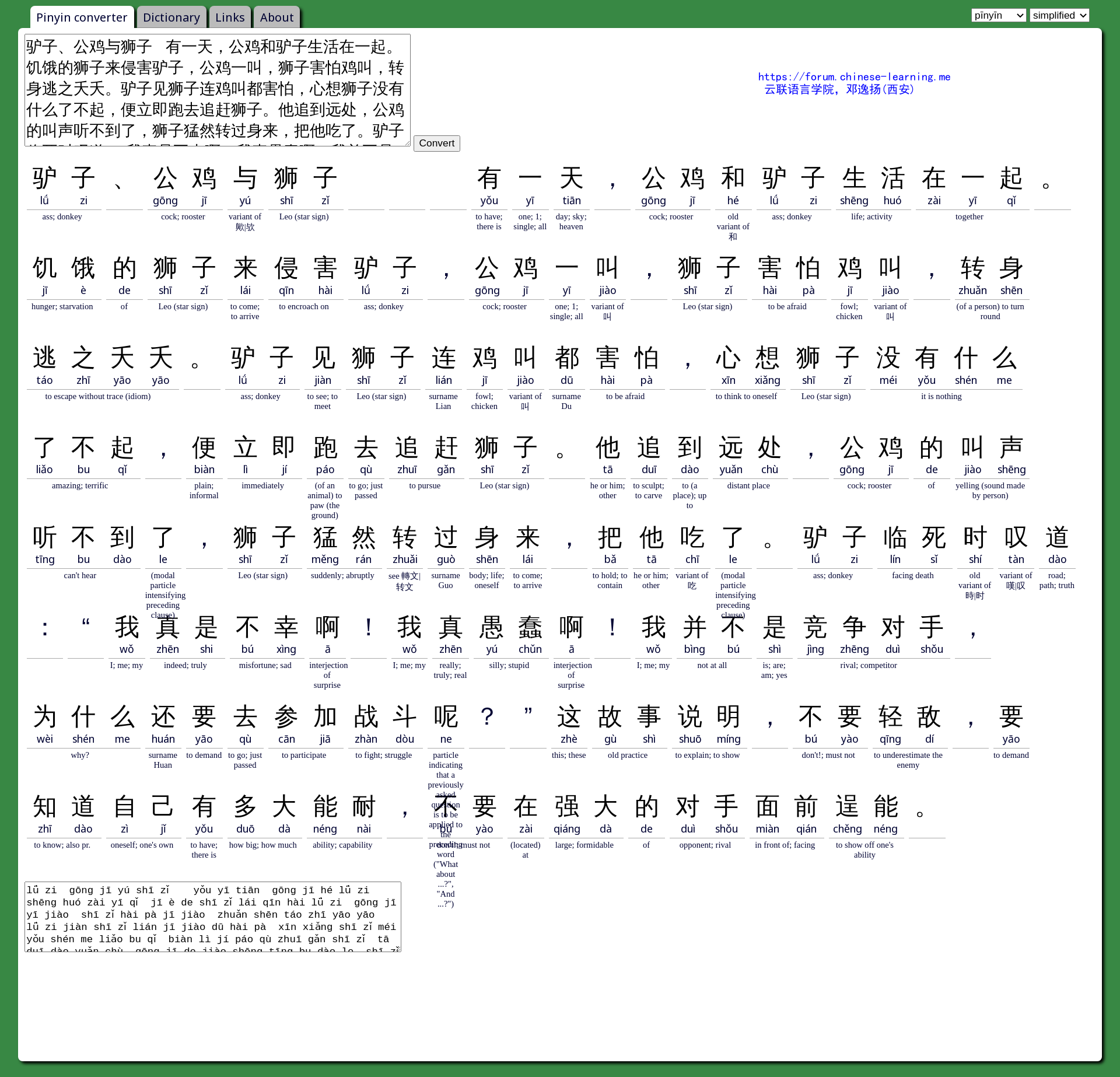
Show Pīnyīn
有一天,公鸡和驴子生活在一起。饥饿的狮子来侵害驴子,公鸡一叫,狮子害怕鸡叫,转身逃之夭夭。驴子见狮子连鸡叫都害怕,心想狮子没有什么了不起,便立即跑去追赶狮子。他追到远处,公鸡的叫声听不到了,狮子猛然转过身来,把他吃了。驴子临死时叹道:“我真是不幸啊!我真愚蠢啊!我并不是竞争对手,为什么还要去参加战斗呢?”
这故事说明,不要轻敌,要知道自己有多大能耐,不要在强大的对手面前逞能。
yǒu yītiān , gōngjī hé lǘzi shēnghuó zài yīqǐ 。 jīè de shīzi lái qīnhài lǘzi , gōngjī yījiào , shīzi hàipà jījiào , zhuǎnshēn táozhīyāoyāo 。 lǘzi jiàn shīzi lián jījiào dū hàipà , xīnxiǎng shīzi méiyǒu shénme liǎobuqǐ , biàn lìjí pǎo qù zhuīgǎn shīzi 。 tā zhuīdào yuǎnchù , gōngjī de jiàoshēng tīng bùdào le , shīzi měngrán zhuǎnguòshēn lái , bǎ tā chī le 。 lǘzi línsǐshí tàn dào : “ wǒ zhēnshi bùxìng a ! wǒ zhēn yúchǔn a ! wǒ bìng bùshì jìngzhēngduìshǒu , wèishénme huányào qù cānjiā zhàndòu ne ? ”
zhè gùshi shuōmíng , bùyào qīngdí , yào zhīdào zìjǐ yǒu duō dà néngnài , bùyào zài qiángdà de duìshǒu miànqián chěngnéng 。

One day the rooster and the donkey lived together. A hungry lion came to attack the donkey. When the rooster crowed, the lion was afraid of the rooster and turned around and ran away. When the donkey saw that the lion was afraid of the rooster crowing, the donkey thought that the lion was nothing special, so he immediately ran to chase the lion. He chased him so far that the crowing of the rooster could no longer be heard. The lion suddenly turned around and ate him. When the donkey was about to die, he sighed: "I am so unfortunate! I am so stupid! I am not a competitor, why should I go to fight?"
This story shows that don't underestimate the enemy, you must know how capable you are, and don't show off your strength in front of a powerful opponent.
Un día el gallo y el burro vivían juntos. Un león hambriento vino a atacar al burro. Cuando el gallo cantó, el león tuvo miedo del gallo y se dio la vuelta y se escapó. Cuando el burro vio que el león tenía miedo del canto del gallo, el burro pensó que el león no era nada especial, así que inmediatamente corrió tras el león. Lo persiguió tanto que ya no se oía el canto del gallo, y de repente el león se dio la vuelta y se lo comió. Cuando el burro estaba a punto de morir, suspiró: "¡Soy tan desafortunado! ¡Soy tan estúpido! No soy un competidor, ¿por qué debería ir a pelear?"
Esta historia muestra que no subestimes al enemigo, debes saber cuán capaz eres y no mostrar tu fuerza frente a un oponente poderoso.
Un jour, le coq et l'âne vivaient ensemble. Un lion affamé est venu attaquer l'âne. Lorsque le coq a chanté, le lion a eu peur du coq et s'est retourné et s'est enfui. Quand l'âne a vu que le lion avait peur du chant du coq, l'âne a pensé que le lion n'avait rien de spécial, alors il a immédiatement couru après le lion. Il le poursuivit si loin qu'on n'entendit plus le chant du coq, et le lion se retourna soudain et le dévora. Quand l'âne était sur le point de mourir, il soupira : "Je suis si malheureux ! Je suis si stupide ! Je ne suis pas un compétiteur, pourquoi devrais-je aller me battre ?"
Cette histoire montre que ne sous-estimez pas l'ennemi, vous devez savoir à quel point vous êtes capable et ne pas montrer votre force face à un adversaire puissant.
ある日、雄鶏とロバが一緒に暮らしていました。お腹をすかせたライオンがロバを襲おうとやってきて、雄鶏が鳴くと、ライオンは雄鶏を恐れて振り向いて逃げました。ロバはライオンが雄鶏の鳴き声を恐れているのを見ると、ライオンは特別なものではないと思い、すぐにライオンを追いかけました。雄鶏の鳴き声が聞こえなくなるほど追いかけたところ、ライオンは突然振り向いて彼を食べました。ロバが死にそうになったとき、ロバはため息をつきました。
この物語は、敵を過小評価してはならないこと、自分がどれだけ有能かを知らなければならないこと、そして強力な敵の前で自分の力を誇示してはならないことを示しています。
Eines Tages lebten der Hahn und der Esel zusammen. Ein hungriger Löwe kam, um den Esel anzugreifen. Als der Hahn krähte, fürchtete sich der Löwe vor dem Hahn und drehte sich um und rannte davon. Als der Esel sah, dass der Löwe Angst vor dem Krähen des Hahns hatte, dachte der Esel, dass der Löwe nichts Besonderes sei, also rannte er sofort hinter dem Löwen her. Er jagte ihn so weit, dass das Krähen des Hahns nicht mehr zu hören war und der Löwe sich plötzlich umdrehte und ihn fraß. Als der Esel sterben wollte, seufzte er: "Ich bin so unglücklich! Ich bin so dumm! Ich bin kein Konkurrent, warum sollte ich kämpfen?"
Diese Geschichte zeigt, dass Sie den Feind nicht unterschätzen sollten, Sie müssen wissen, wie fähig Sie sind, und nicht vor einem mächtigen Gegner mit Ihrer Stärke angeben.